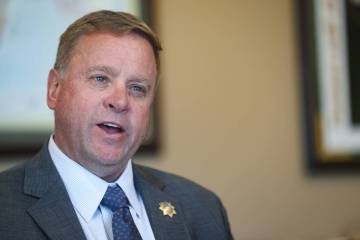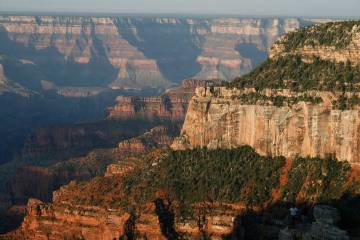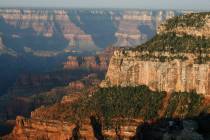Nevada-Utah water pact weighed
It could be weeks before officials in Nevada and Utah are ready to sign an unprecedented pact that divides water in a shared basin targeted as a water source for Las Vegas.
That's if they sign it at all.
For now, Gov. Jim Gibbons and Utah Gov. Gary Herbert are withholding final judgment about the Snake Valley agreement, which was reached in August after four years of closed-door negotiations among officials from both states.
"Governor Gibbons needs to study the details of the agreement before he will be prepared to offer his viewpoint," spokesman Daniel Burns said.
Herbert recently told Snake Valley residents that some kind of agreement is in the best interests of Utah.
"Whether it is the exact agreement that has been put forward by the parties, however, he is not certain," spokeswoman Angie Welling said.
She added that Herbert "will entertain changes to the current agreement now in draft form."
The governors won't sign the pact themselves, but they do have sway over the two men who might: Allen Biaggi, director of the Nevada Department of Conservation and Natural Resources, and his Utah counterpart, Mike Styler.
Biaggi and Styler headed the negotiating teams from their respective states.
The agreement divides groundwater in Snake Valley between the states and provides protections for farmers, ranchers and other residents.
It also could clear the way for the Southern Nevada Water Authority to tap the basin, though the agency will have to wait another decade for approval of its plans there.
As part of the pact, Nevada agreed to delay a hearing on the authority's water applications in Snake Valley until September 2019 to allow time for additional environmental studies.
Biaggi declined to predict when the final draft of the agreement will be finished and ready to be signed.
Nevada and Utah accepted public comment on the pact through Sept. 30.
Biaggi said he and Styler will meet in the coming weeks to review the roughly 20 written comments submitted and discuss how best to address them in the final draft of the water agreement.
"We want to address them thoroughly and completely," Biaggi said.
The comments came from a variety of sources, including rural residents, city dwellers and tribal representatives in Nevada and Utah.
"We even got some comments from the Eastern Seaboard," Biaggi said.
The agreement has been widely criticized in Utah. The state's largest newspaper, the Salt Lake Tribune, has urged against signing it any time soon. The state's largest physicians' group sent a letter to Herbert late last month warning that large-scale groundwater pumping could dry the valley and foul the air, thus threatening lives in Utah's western desert and beyond.
Biaggi said he was somewhat confused by that argument because the agreement "outlines very clearly" the environmental monitoring that will be required.
"And of course we can't violate state or federal air quality standards," he said.
The agreement would be the first of its kind between Nevada and Utah.
It was prompted by a 2004 federal law requiring a deal between the two states before groundwater can be exported from any of the shared basins along the border.
The Southern Nevada Water Authority is a party to the deal but receives no water as a direct result of it. Biaggi said the pact simply allocates water between the states; it does not give anyone the right to pump it.
"The big decision would be ten years down the road" when Nevada's state engineer rules on the water authority's applications to siphon billions of gallons of groundwater a year from Snake Valley, Biaggi said. "The real tale of the tape will come down to the state engineer's decision."
If the agreement between Nevada and Utah falls through, Biaggi said, his office would return to its previous schedule, which called for the state engineer to hold a hearing on the authority's Snake Valley applications in September 2011.
Contact reporter Henry Brean at hbrean@ reviewjournal.com or 702-383-0350.
on the web
Download a draft of the Snake Valley water sharing agreement: http://water.nv.gov/




























